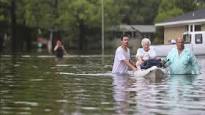Hurricane Harvey – 5 Potential Reasons Why We Don’t Respond (& How to Get Past Them)
The devastation of Hurricane Harvey is massive — and is evident in numerous ways: water damage to homes and businesses, loss of personal belongings, displaced individuals and families, 300,000+ cars left unusable, businesses not able to do business, schools shut down, nursing home residents moved… the list goes on and on.
Unfortunately, the sheer size and impact of Harvey actually creates some dynamics that makes it more likely that people (including you and me) won’t respond to the vast needs created. How can that be? Why would we be less likely to give some form of aid (monetary aid, donations of items, volunteering)?
The human mind is an odd thing. How we process information and respond to situations is rarely truly logical. This includes disasters (natural, man-made, or other.) Here are 5 ways we seem to talk ourselves out of responding with the empathy and care that the situation calls for:
1. The sheer size of the event and the resulting needs overwhelm us – and leads to inaction. The hundreds of thousands of homes made unlivable, the thousands of businesses wrecked, along with the millions of individuals, children and families overwhelms our brains. We can’t “get our head around” how vast the needs are. We can’t visualize how everyone can be helped – and for many of us this leads to a paralysis. We don’t do anything except keep watching the news (possibly telling ourselves, “I’m going to wait to find out what is really needed and then I’ll do something), gathering more information, seeing more pictures and videos – but never doing anything in response.
2. The misbelief that whatever small act of charity we can do won’t make a difference. We may think, “They need millions and millions of dollars and I only have $25 ($50; $100; $1,000 – whatever the amount) and it won’t really make a difference.” But the numbers show this isn’t true. If each adult in the U.S. not impacted directly by the hurricane and flooding, gave $10 to help the flood victims, the result would be around $1.5 billion (which is not chump change and would make a significant difference in hundreds of thousands of individuals’ lives.) The same principle is true for donating diapers, blankets or canned food, or for volunteering some of your time: A little bit given by a lot of people has a BIG impact.
3. Falling into “the victims are partially at fault” mindset. This is easier to fall into than you might think, but as shown below, can be inappropriately applied to virtually any situation (including ones we personally experience).
- They shouldn’t live …so close to the ocean.
- They shouldn’t live … where earthquakes (tornados, blizzards, drought, flooding, wildfires..) are expected.
Virtually all of us live where some form of natural disaster occurs at least occasionally. (We all have to live somewhere.)
4. Believing that helping the victims is really someone else’s responsibility. Maybe. Maybe not. (I’m not sure how you decide whose responsibility it is to help.) I think the real issue is: There are millions of people in true need, and I have some resources that could help them. The Golden Rule clearly seems to apply here: Do for others what you would like for them to do for you if you were in the same situation.
5. Feeling guilty that you haven’t done anything yet … and that it is too late, or people will wonder why you haven’t given yet, or … Don’t let your feelings of guilt, embarrassment, or shame get in the way. Here is a fact to base your decision on: Doing something (and helping a fellow human) is better than not doing anything.
Let me conclude with a brief explanation of 3 types of empathy that have been identified (initially by Daniel Goleman), because they are pertinent here:
- Cognitive Empathy. This is essentially the level of empathy where we intellectually can understand another person’s experience in a situation. “Wow. That would be tough to have your home flooded and your possessions ruined.”
- Emotional Empathy. This level of empathy occurs when we experience at a true feeling level how a circumstance impacts another person. We feel the emotion they are experiencing with them. “I am so upset about how the flooding has impacted so many families. The loss of their homes, family pictures and their normal daily lives just makes me sad for them.”
- Compassionate Empathy. Beyond intellectual assent of how bad the situation is, and beyond feeling compassion for the victims, compassionate empathy moves us to action – we choose to act in a way to help those for whom we feel compassion.
Please, join me. Commit to yourself right now that you won’t let the traps identified above lead you to inaction. I commit to you that I am going to act today to do something to help the flood victims. We will all be better for choosing to help our fellow men, women, senior citizens and children.
* * * * * *
Here are few of the many organizations where you can donate money, resources or time, and who have shown themselves to be responsible in wisely using the resources given to them to share with those in need:
There are numerous other helpful organizations but, when you give a donation, please make sure the organization you choose is reputable.
Tags: empathy, Hurricane, Hurricane Harvey relief, hurricane relief, misbeliefs
Categories Blog, Gratitude, Relationships, Teamwork, Thankfulness, Uncategorized
